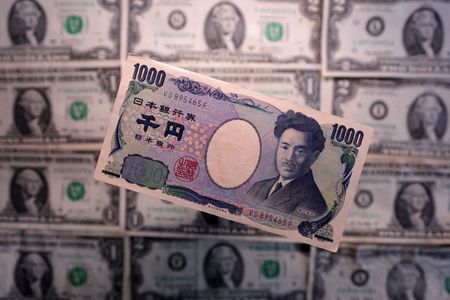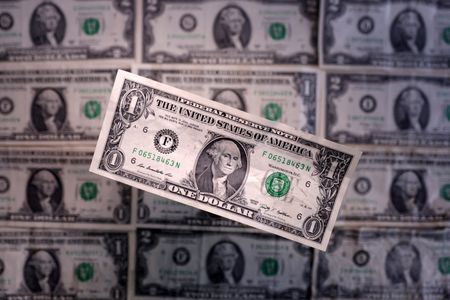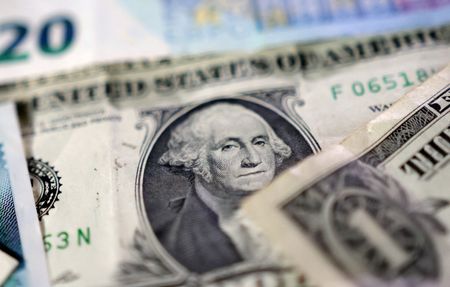By Karen Brettell
NEW YORK (Reuters) -The U.S. dollar was boosted for a second day on Wednesday on optimism that trade deals will brighten the U.S. economic outlook, while the Japanese yen was weaker after the government saw soft demand for 40-year bonds.
Pessimism over the U.S. economy has declined after President Donald Trump delayed on the weekend a plan to impose 50% tariffs on European Union imports and following a deal with China earlier this month to reduce tariffs imposed on each other.
“The weekend’s quick reversal of tariff threats against Europe has bolstered risk appetite and reduced negative perceptions of the U.S. growth trajectory, and so that’s boosting the dollar,” said Karl Schamotta, chief market strategist at Corpay.
Investors are also focused on Nvidia’s earnings due after Wednesday’s stock market close, which are likely to influence risk sentiment. A strong result would likely boost the U.S. currency, said Schamotta.
The dollar had little reaction to minutes from the Federal Reserve’s May 6-7 meeting released on Wednesday.
Fed officials acknowledged they could face “difficult tradeoffs” in coming months in the form of rising inflation alongside rising unemployment, an outlook buttressed by Fed staff projections of increased risks of a recession.
The Fed kept rates unchanged at the meeting. Fed funds futures traders see the U.S. central bank as most likely to resume interest rate cuts in September.
Much stronger consumer confidence data on Tuesday bolstered the view that the U.S. economy remains solid, and until there are clear signs of weakening, the Fed is expected to prioritize inflation concerns in its monetary policy decision-making.
SUPER-LONG SELLOFF
The euro was last down 0.35% against the greenback at $1.1288. Against the Japanese yen, the dollar strengthened 0.33% to 144.8.
The dollar index rose 0.39% to 99.92.
Demand at an auction of 40-year Japanese government bonds on Wednesday fell to the lowest since July, amid a selloff in super-long debt this month.
The yen fell around 1% against the greenback on Tuesday on reports that Japan will consider trimming issuance of super-long bonds in the wake of recent sharp yield increases.
Soft demand for longer-dated debt globally has drawn attention to worsening government deficits. Traders are also watching progress of a budget and spending bill in U.S. Congress that is expected to add trillions of dollars of debt.
Trump said on Wednesday that he plans to negotiate aspects of the “big, beautiful” tax bill, expressing dissatisfaction with certain provisions while being satisfied with others.
The Australian dollar weakened 0.33% versus the greenback to $0.6422.
Data earlier showed that Australian consumer inflation held steady in April, leaving hopes for more interest rate cuts mostly intact.
The New Zealand dollar strengthened 0.2% to $0.5958.
The country’s central bank signalled it might be nearer to an end to easing than some in the market had hoped for, as it cut rates by 25 bps as expected.
(Reporting by Karen Brettell; Additional reporting by Ankur Banerjee, Johann M Cherian in Singapore and Linda Pasquini in Gdansk; Editing by Kirsten Donovan, David Holmes and Matthew Lewis)











